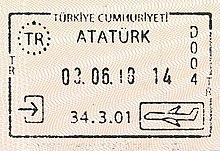
Back سياسة تأشيرة تركيا Arabic トルコの査証政策 Japanese თურქეთის სავიზო პოლიტიკა Georgian Визна политика на Турција Macedonian Türkiye'nin vize politikası Turkish Turkiyaning viza siyosati Uzbek Chính sách thị thực của Thổ Nhĩ Kỳ Vietnamese 土耳其签证政策 Chinese
 |
|---|
|
|

The visa policy of Turkey deals with the requirements that a foreign national wishing to enter Turkey must meet to be permitted to travel to, enter and remain in the country.[1]
Visitors to Turkey must obtain a visa from one of the Turkish diplomatic missions unless they come from one of the 95 visa-exempt countries and territories or one of the 22 countries and territories whose citizens are eligible to apply for an electronic visa. Turkish visas are documents issued by the Ministry of Foreign Affairs and its subsequent diplomatic missions abroad with the stated goal of regulating and facilitating migratory flows.[2][3]
Visitors of most nationalities must hold a passport valid for no less than 150 days from the date of arrival. The passport validity requirement does not apply to citizens of Belgium, France, Luxembourg, Portugal, Spain, and Switzerland who can enter with a passport expired for less than five years, citizens of Germany who can enter with a passport or an ID card expired for less than one year, citizens of Bulgaria who are only required to have a passport valid for their period of stay.[4] An identity card is accepted instead of a passport for citizens of Azerbaijan, Belgium, Bulgaria, France, Georgia, Germany, Greece, Hungary, Italy, Liechtenstein, Luxembourg, Malta, Moldova, Netherlands, Northern Cyprus, Poland, Portugal, Romania, Spain, Switzerland, and Ukraine.[5]
The validity period requirement also does not apply to nationals of countries whose identity cards are accepted.[5][6][7][8][9]
Even though Turkey is a candidate country for membership of the European Union, it has a more complex visa policy than the visa policy of the Schengen Area.[2] Turkey requires visas from citizens of one EU member state (the Republic of Cyprus), as well as Schengen Annex II countries and territories – Antigua and Barbuda, Australia, Bahamas, Barbados, Dominica, East Timor, Grenada, Kiribati, Marshall Islands, Mauritius, Mexico, Micronesia, Palau, Saint Lucia, Saint Vincent and the Grenadines, Samoa, Solomon Islands, Taiwan, Tonga and Tuvalu. However, citizens of most of these countries can obtain electronic visas. On the other hand, Turkey grants visa-free access to citizens of other countries and territories – Azerbaijan, Belarus, Bahrain, Belize, Bolivia, Ecuador, Indonesia, Iran, Kosovo, Kyrgyzstan, Jordan, Lebanon, Mongolia, Morocco, Oman, Qatar, Russia, Saudi Arabia, Thailand, Tunisia and Uzbekistan.
- ^ "Visa and passport". Timatic. International Air Transport Association through Emirates. Retrieved 1 April 2017.
- ^ a b "From Rep. of Turkey Ministry of Foreign Affairs". Republic of Türkiye Ministry of Foreign Affairs. Archived from the original on 21 July 2016. Retrieved 3 April 2018.
- ^ "T.C. Dışişleri Bakanlığı Turkish Embassy in New Delhi". Archived from the original on 2018-10-21. Retrieved 2018-10-20.
- ^ "Passport Validity Requirements While Entering Turkey by Law on Foreigners and International Protection". Turkish MFA. Archived from the original on 2017-09-12. Retrieved 2017-09-12.
- ^ a b "Countries whose citizens are allowed to enter Türkiye with their national ID's / Republic of Türkiye Ministry of Foreign Affairs". Mfa.gov.tr. Archived from the original on 2024-05-21. Retrieved 2016-05-04.
- ^ Polonya Cumhuriyeti'nin Kimlik Kartı Hamili Vatandaşlarının Türkiye'ye Yapacakları Her 180 Gün İçinde Azami 90 Gün İkamet Süreli Turistik Amaçlı Seyahatlerinde ve Transit Geçişlerinde Vize Muafiyeti Sağlanması Hakkında Karar (PDF) (Cumhurbaşkanı kararı 5423) (in Turkish). President of the Turkish Republic. April 18, 2022. Archived 2022-04-19 at the Wayback Machine
- ^ Bulgaristan Cumhuriyeti'nin Kimlik Kartı Hamili Vatandaşlarının Türkiye'ye Yapacakları Her 180 Gün İçinde Azami 90 Gün İkamet Süreli Turistik Amaçlı Seyahatlerinde ve Transit Geçişlerinde Vize Muafiyeti Sağlanması Hakkında Karar (PDF) (Cumhurbaşkanı kararı 5887) (in Turkish). President of the Turkish Republic. July 27, 2022. Archived 2022-07-28 at the Wayback Machine
- ^ "Bosna Hersek'e kimlik kartıyla seyahat dönemi". 6 September 2022.
- ^ "CUMHURBAŞKANI KARARI (Presidential decision)" (PDF). 2022-11-09. Retrieved 2023-12-29.